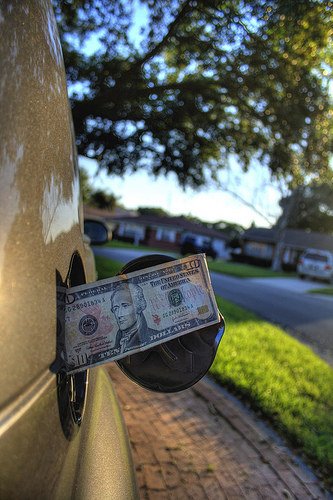Gas prices were the highest they’ve ever been on the West Coast over this past Memorial Day weekend. However much  gas costs, though, we always have some control over how much we spend on it. These tips will help you take back that control. People in the U. S. are driving less than they did in 2007, by 3%, and the young generation is trending away from buying new cars or rushing to get their driving licenses. When we spend less on gas we reduce our carbon emissions and inch closer to energy independence for our nation. We also tend to lose weight: the less time people spend driving, the less they weigh on average. This is an updated version of one of my most-visited posts.
gas costs, though, we always have some control over how much we spend on it. These tips will help you take back that control. People in the U. S. are driving less than they did in 2007, by 3%, and the young generation is trending away from buying new cars or rushing to get their driving licenses. When we spend less on gas we reduce our carbon emissions and inch closer to energy independence for our nation. We also tend to lose weight: the less time people spend driving, the less they weigh on average. This is an updated version of one of my most-visited posts.
Drive slower: A gentle right foot when driving around town can cut fuel consumption by 27-35%, according to Edmunds.com. This can mean getting 31 mpg instead of 22 mpg. Examples: accelerating slowly from green lights and decelerating slowly when approaching red lights. The smoother a car’s overall motion, the more gas money you save. The more herky-jerky the motion, with faster starts and stops, the more gas money you are throwing away.
Use your body for short trips, i.e. bike or walk: Did you know 40% of U.S. trips are two miles or less? Perfect length for biking and walking. While these choices are most pleasant (sometimes ecstatic) in nice weather, we save just as much gas money in less-nice weather. Try this fun pep-talk on choosing bicycling over driving for a short trip, or this comic heroic account of bicycling in the rain. Treat the destinations close to you as your top picks, whether grocery stores, social opportunities, dry-cleaning or restaurants. Even if the prices may be a bit higher, using no gas to get there may make it the cheaper choice overall. To learn more about your neighborhood’s walkability, use this “Walk-score ” website. If you’d consider bicycling but have safety concerns, get tips from this bicycling safely website.
Streamline your vehicle: The aim is minimal wind resistance. Keep the windows and sunroof closed, especially at higher speeds. An engineer I know told me he gets 5-7 more miles per gallon when he takes the rack off the top of his Subaru Outback. “It’s the wind resistance, much more than the weight,” he reports. For open bed pick-up trucks, keeping the gate up has been shown to improve gas mileage over lowering the gate, and there is also evidence that removing the tailgate and replacing it with a cargo net improves gas mileage.
Consider carsharing. It’s getting more popular every year, and can bring households from two cars down to one, or from one car to no cars — while still getting where you need to go. My favorite kind of carsharing, and the fastest-growing, is Getaround. Another kind is Zipcar. My husband and I have shared a single vehicle (currently a Honda hybrid) for many years. While our bicycles and public transit have helped us avoid the huge expense of a second car, another enabler has been using Zipcar when we both actually need to drive different places at the same time (a much rarer occurrence than you would think).
Use cruise control on highways — when they’re flat: The single, consistent speed can improve mileage by almost 14%. It’s easy to forget to use cruise control, if I am any example; I should put a post-it reminder on the dashboard. It’s not good for hills, though, when going slower conserves fuel.
Pick up the phone: The humble telephone is a powerful money-saving device. Does the Home Depot across town actually still have that item you want in stock, or are you just hoping it does? It takes a few minutes to call and ask them to check for you — but it takes much longer, plus several dollars in gas, to drive over and perhaps find you made a wasted trip.
Try using public transit if you live in an area where transit is available. In many cases, the fare is less than you’d pay for gas. If you like to read, work or knit while riding, you can come out ahead overall in time-use. In congested areas, transit may even be faster than driving alone and then circling to find a parking space. Studies show that people consistently overestimate how long it would take them to reach a destination via transit, and underestimate how long an auto trip would take.
Build your collateral in things other than your car: Cars (unless they are hybrids, apparently) depreciate rapidly in value from the moment we buy them. Spending money on a car’s appearance, performance or accessories may not be in your best financial or overall interest as much as if you were to invest in your relationships, education, character, spiritual life, home, investing skills, etc.
Reconsider the air conditioning: Using it reduces fuel economy by 10-20%. However, that applies to in-town driving. At highway speeds it’s more cost-efficient to roll the windows up and use the a/c, due to the lowered wind resistance of being more streamlined.
Turn off the engine rather than idle for 20 seconds or more: I’m amazed by people leaving their engines on, burning precious gas, while waiting 4-10 minutes for a bridge here in Portland to let a ship through. Also, don’t “warm up” your vehicle for more than 20 seconds. It’s a myth that modern engines get any benefit from this.
Declutter your vehicle: Less weight means less gas used to haul it around. I finally took our winter chains out of our trunk last Friday. (I left the first-aid kit and gallon of emergency water in, though.)
Make only right turns Doing trips this way takes some forethought, but again, our gas-tanks literally pay us for using our brains. (I must modestly admit I had figured this trick out many years before UPS did.
Finally, find places for privacy and solitude other than your car: It’s easy to unconsciously use our cars for needs that have nothing to do with transportation. The needs are legitimate and human; using cars and gas to meet them is costly both to us and our shared planet. Nature, libraries, parks, designated room in one’s home and the right kind of coffee shop may be better places for privacy and solitude than our cars.


 Subscribe
Subscribe
Some great tips here Alison. I’d add to it fill up your tank when it’s still a third full. If you let it get right down near the empty needle, the gas (or petrol as we quaintly say in the UK) stirs up all kinds of rubbish from the bottom of the tank and impacts engine performance, which in turn costs more fuel.
Thanks, Tess, that’s a good additional tip, for reasons beyond the one you’re citing
And, petrol and rubbish are both great words. I love your UK lingo.
Definitely important sounds as always, Alison! I am really impressed to know that crucial topic about the way of spend less money on Gas. I think that it is very inspirational for us to take a long step to less or reduce cost. Thanks!